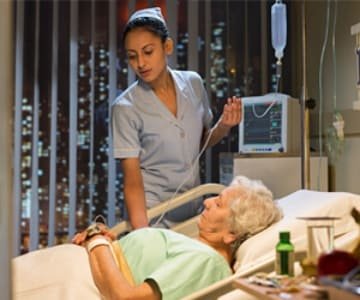POST SURGERY NURSING CARE
Undergoing surgery is a significant life event, and proper post-operative care plays a crucial role in ensuring a smooth and healthy recovery. Whether you or a loved one is recovering from a surgical procedure, providing the right care at home can help prevent complications, promote healing, and improve overall well-being. Below, we’ll explore the best practices for post-surgical wound care, post-operative nursing care, and how to receive professional nursing services at home for a seamless recovery.

Post-operative care
Immediate Post-Operative Care
- Monitor Vital Signs: Regularly check blood pressure, heart rate, temperature, oxygen levels, and pain.
- Airway and Breathing: Ensure the airway is clear, administer oxygen if needed, and monitor for respiratory distress.
Wound and Surgical Site Care
- Inspect Wounds: Check for infection, ensure dressings are intact, and observe for abnormal drainage.
- Drain Management: Measure output, ensure drains are patent, and document findings.


Pain Management
- Pain Assessment: Use a pain scale to monitor and assess pain levels.
- Medications: Administer prescribed pain medications and adjust based on the patient’s response.
Discharge Planning
- Instructions: Provide clear instructions for wound care, medications, and activity restrictions.
- Follow-up Care: Ensure the patient has follow-up appointments and knows how to reach medical providers for concerns.
Steps to Arrange Post-Operative Nursing Care Near You:
Consult with the Hospital or Surgeon:
- Many hospitals partner with home care agencies and can recommend trusted providers.
Search for Local Home Care Agencies:
- Look for agencies that specialize in post-operative care.
Check for Licensed Professionals:
- Ensure the nurses or caregivers are certified and experienced in handling post-operative cases.
Review Services and Costs:
- Confirm what is included in the care package and any additional costs.
Schedule a Consultation:
- Meet with the care provider to discuss the specific needs and expectations.
Benefits of our services
- Comfort and familiarity of home.
- Personalized, one-on-one care.
- Reduced risk of hospital-acquired infections.
- Cost-effective compared to prolonged hospital stays.
- Emotional support for patients and families.
- Elderly individuals requiring assistance.
- Patients with chronic illnesses or disabilities.
- Post-hospitalization patients.
- Individuals needing palliative or hospice care
Home Services Offered After Surgery

Medical Services:
Medication administration. Wound care and dressing changes.

Personal Care:
Assisting with daily living activities (bathing, dressing, grooming). Helping with mobility and transfers.

Specialized Care:
Palliative care for terminally ill patients. Dementia or Alzheimer’s care

Health Monitoring:
Regular health assessments and updates. Coordinating with doctors and other healthcare professionals
Post-Surgery Nursing Care FAQ
1. What kind of support will the nursing home provide?
Nursing homes offer:
- 24/7 monitoring of vital signs and overall health.
- Wound care, dressing changes, and medication administration.
- Assistance with mobility and rehabilitation.
- Nutrition planning and meal preparation tailored to recovery needs.
2. How is pain managed in a nursing home?
- Medications are administered on a schedule as prescribed by the doctor.
- Non-pharmacological methods, such as heat/cold therapy or repositioning, may also be used.
3. How is mental well-being addressed?
- Staff provide companionship and emotional support.
- Social activities are often encouraged to reduce isolation.
- Referrals to counselors or therapists if depression or anxiety is noted.
4. Who manages medications in a nursing home?
Licensed nurses ensure medications are given on time, in the correct dosages, and monitor for side effects.
5. Will physical therapy be available?
Yes, nursing homes typically have physical therapists to assist with mobility and recovery. Therapy is tailored to the patient’s condition and surgery type.
Contact Us for POST SURGERY NURSING CARE
“Nurses are the heart of healthcare, guiding patients through recovery with compassion, care, and expertise.”
